
Oklahoma’s Republican governor has signed a bill to make performing an abortion illegal in the state, with providers facing felony charges with up to 10 years in prison and fines of up to $100,000, marking the most severe restrictions on abortion care in the US.
Republican Governor Kevin Stitt signed Senate Bill 612 into law at a ceremony surrounded by anti-abortion advocates and faith leaders at the state capital on 12 April.
“We want to outlaw abortion in the state of Oklahoma,” he said, denouncing “liberal activists from the coast who always seem to want to come in and dictate a mandate and change our way of life” ahead of mounting legal challenges to the measure.
The law makes an exception for abortions performed to save the life of the mother but does not make exceptions for rape or incest.
If the measure survives anticipated legal challenges, it is scheduled to go into effect this summer following the adjournment of the state’s legislative session.
Unlike several other anti-abortion measures that have advanced in the state, it does not include an emergency clause that triggers an immediate effective date. The governor is expected to sign another bill that does – that measure would effectively ban all abortion after six weeks of pregnancy and bar physicians from performing or inducing an abortion at any point unless it is “to save the life” of the pregnant person.
The measures join a wave of anti-abortion bills from Republican state lawmakers across the US, emboldened by the US Supreme Court’s anticipated ruling in a case that could determine the fate of healthcare protections for women if the decades-old precedent from the ruling in Roe v Wade is overturned.
The nation’s high court also has declined to intervene in a Texas case seeking to block that state’s ban on abortion care at six weeks of pregnancy.
Last month, Planned Parenthood reported that Oklahoma abortion providers saw a 2,500 per cent increase in abortion patients with Texas addresses compared to the previous year. Futher eroding abortion access in Oklahoma could have dangerous health consequences for people seeking an abortion in the entire region, advocates have warned.
“The US Supreme Court’s failure to stop Texas from nullifying the constitutional right to abortion has emboldened other states to do the same,” said Nancy Northrup, CEO of the Center for Reproductive Rights, which represents providers in the Supreme Court case.
“Oklahoma’s total abortion ban is blatantly unconstitutional and will wreak havoc on the lives of people seeking abortion care within and outside the state,” she said. “We’ve sued the state of Oklahoma [10] times in the last decade to protect abortion access and we will challenge this law as well to stop this travesty from ever taking effect.”
Should the Supreme Court reject precedent from the landmark Roe ruling, more than two-dozen states already have in place so-called “trigger bans” and other abortion restrictions that would immediately outlaw abortion care.
Governor Stitt on Tuesday said “we certainly don’t want Texans” travelling to Oklahoma for abortion care.
“Hopefully this bill will curb that,” he said.
In the wake of the Texas law, the Trust Women clinic in Oklahoma City “has been indundated” with patients from Texas to access abortion care, according to the group’s advocacy director Myfy Jensen-Fellows.
“The volume of patients has not decreased, and the impact on Oklahoman’s access to abortion care in their own communities has been significant,” she said in a statement. “Patients from Oklahoma are now routinely traveling out of state to access timely abortion care, including many who are visiting our clinic in Wichita, Kansas.”
In Idaho, the first state to approve an abortion ban mirroring the Texas law, the state’s Supreme Court has temporarily blocked the law following a legal challenge from Planned Parenthood.
Both Idaho’s governor and the state’s attorney general have suggested that the ban is unconstitutional.
“It’s a very dark day in Oklahoma,” said Emily Wales, interim president and CEO of Planned Parenthood Great Plains Votes.
“We have been in the middle of a crisis for the last seven months – as Texans have been forced to leave their home states for care – and now Oklahomans may have to do the same,” she said. “It’s unconscionable. But know this: the law signed today is not yet in effect, and abortion remains legal in Oklahoma. We will fight back against these cruel bans in court because people shouldn’t have to cross state lines in secret to access care that should be available in their communities.”







